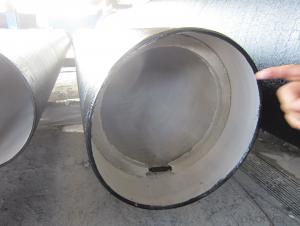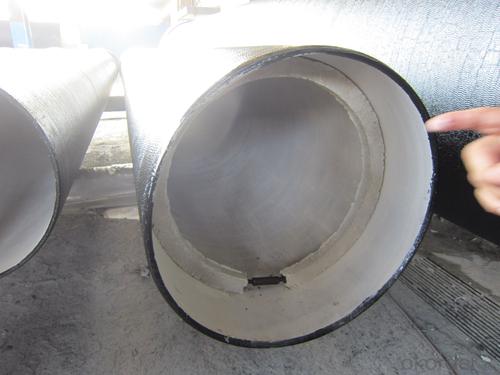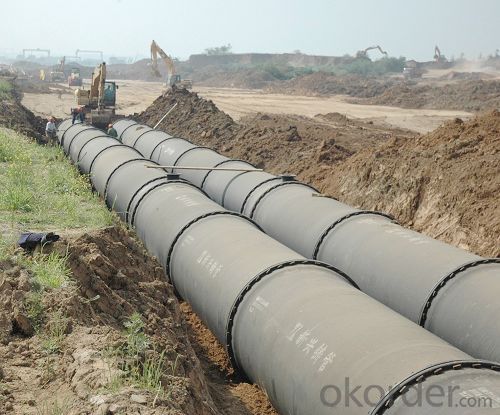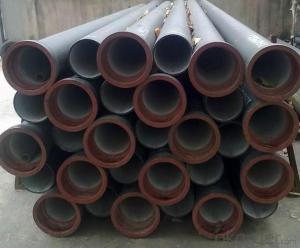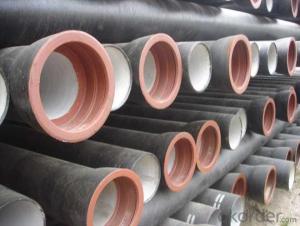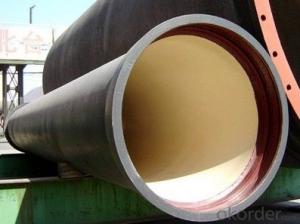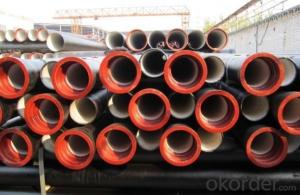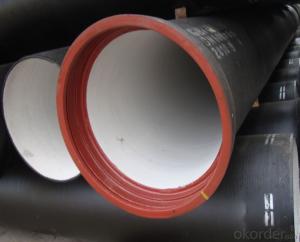Ductile Iron Pipe of China DN150 EN598 Hot Sale
- Loading Port:
- China main port
- Payment Terms:
- TT or LC
- Min Order Qty:
- 20 m.t.
- Supply Capability:
- 100000 m.t./month
OKorder Service Pledge
OKorder Financial Service
You Might Also Like
1,Ductile Iron Pipe Description :
1) Pipes confirm to ISO2531,K9 class,T type joint,6m long,with inside cements lining conform to ISO4179, outside Zinc spraying(130g/m2) and bitumen coating(70μm) conform to ISO8179.
2) Pipe ends: Spigot and socket ends, with 100% SBR rubber gaskets accoding to ISO4633
3) we can do third party inspection according to customer's request.
4) Our products have been sold to many international market, such as Middle East and South East Asia and Africa.
2,Main Features of the Ductile Iron Pipe:
•High yield strength
•High tensile Strength
•High corrosion resistance
•Pressure Resistence
•Anti-corrosion
•Installation is convenient
•Satisfy the highest hygienic standards
Service
• Drawing: we can translate your original drawing, offer best suggestion on design
• Quality: we have full set quality control system to guarantee the best quality.
• Inspection: inspect in house, all our products must be checked 3 times before packing
Packing and Shipping
• standard export package(carton/wooden case/pallet)
• accept FOB,FAS,CNF,CIF door to door etc or customer designated shipping agent
Inspection
• In-house Foundry
• Third party inspection available upon requirement
3,Ductile Iron Pipe Images:
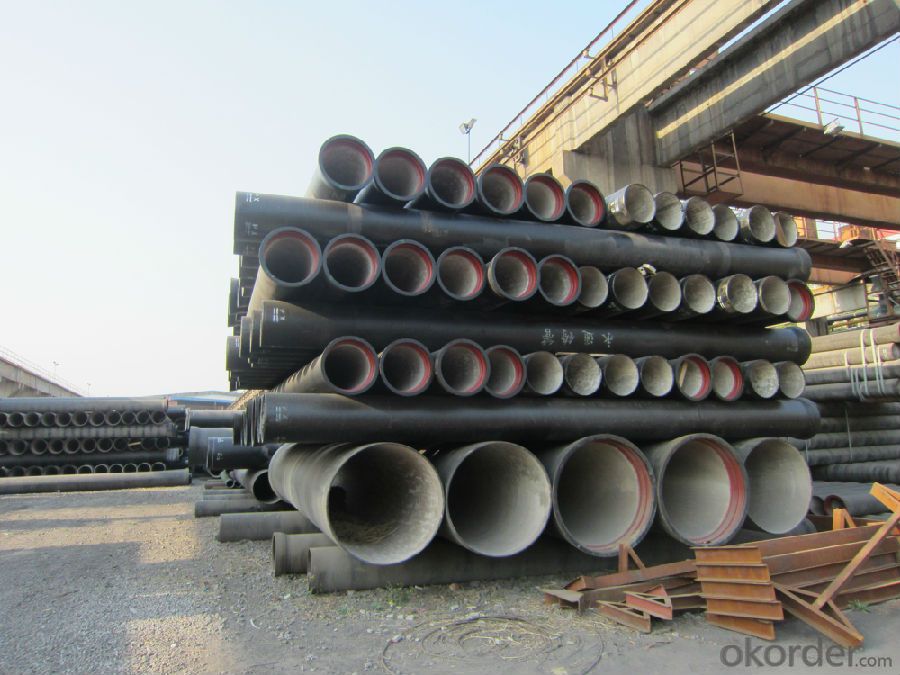
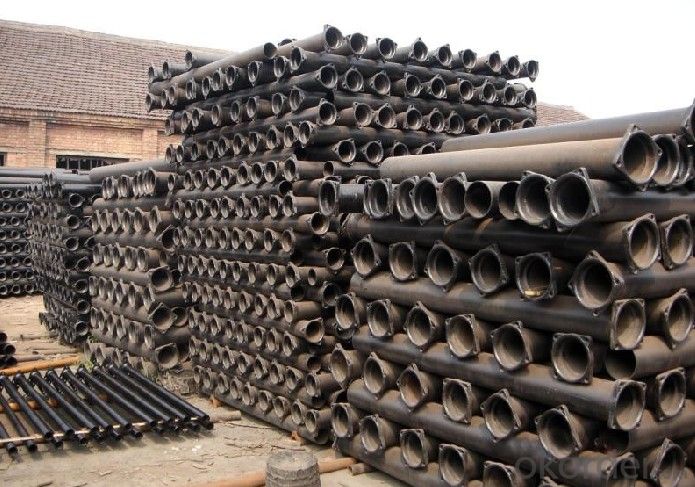
4. Ductile Iron Pipe Specification:
Surface Finishes: Bare, Oiled, Mill Varnish, Galv,FBE, FBE Dual, 3LPE, 3LPP, Coal Tar,Concrete Coating and Tape Wrap
End Finishes: Beveled, Square Cut, Threaded, hat
Additional Services: Internal Coating
Packaging: packed in bag, plastic bag, steel strip, steel wire,double wire, iron box, wooden box, tarpaulin, plastic sheeting
Inspection: MOODY SGS BV GL DNV ABS LIOYD’S
Test: X-ray, UT, magnetic particle,inspection,hydrostatic test.
Processing service: Beveling, Threading, Slotting, Cut-to length, Bends, Quench and Temper, Fabrication, Double-jointing and On-site assistance
Documentary: MTC, material certification,Origin certification, CI or PI,Test Report, export licence, handling order, B/L,insurance policy,shipping instructions, contract, packing list etc.
Internal lining: ductile iron pipes shall have an internal cement mortar lining in acc with ISO4179.
External coating: ductile iron pipes shall be externally coated with metallic zinc spray plus a further layer of resin painting to ISO8179.
5.FAQ:
We have organized several common questions for our clients,may help you sincerely:
1.Q: Why would you choose ductile iron pipe rather than other pipe materials?
A:The reasons are obvious for that not only ductile iron pipe possesses the inherent strength and flexibility of ductile iron, combined with proven corrosion protection systems, but also the cost savings can be achieved from design to installation and commissioning.
2.Q:Why can you guarantee the inner of pipes can’t be corroded?
A: High alumina cement mortar lining and sulphate-resistant cement mortar lining. These two special linings are applicable to inner anti-corrosion for sewage pipes, improving resistance to erosion of the sewage components.
- Q: Can ductile iron pipes be used in areas with high soil acidity?
- Ductile iron pipes can be used in areas with high soil acidity, but certain precautions should be taken to ensure their longevity and performance. Ductile iron pipes are known for their strength, durability, and resistance to corrosion, which makes them suitable for various soil conditions, including those with high acidity. However, high soil acidity can still pose a potential risk to ductile iron pipes over time. Acidic soils can accelerate the corrosion process, potentially leading to the degradation of the pipe material. To mitigate this risk, several measures can be implemented: 1. Protective Coatings: Applying protective coatings to the outer surface of the ductile iron pipes can provide an extra layer of defense against soil acidity. These coatings, such as epoxy or polyethylene, act as a barrier, preventing direct contact between the pipe and the corrosive soil. 2. pH Adjustment: Adjusting the pH levels of the soil can help reduce its acidity. This can be done by adding lime or other neutralizing agents to the soil, which will help create a more favorable environment for the ductile iron pipes. 3. Cathodic Protection: Implementing cathodic protection systems can be an effective method to prevent corrosion in ductile iron pipes. This technique involves the use of sacrificial anodes or impressed current systems to create a protective electrical current that counteracts the corrosive effects of the soil. 4. Regular Inspections: Periodic inspections should be conducted to monitor the condition of the ductile iron pipes in areas with high soil acidity. This allows for early detection of any corrosion or degradation, enabling timely repairs or replacements to be carried out. By implementing these measures, ductile iron pipes can be effectively used in areas with high soil acidity, ensuring their long-term performance and minimizing the risks associated with corrosive soils. However, it is always recommended to consult with experts or engineers familiar with local soil conditions and the specific requirements of the project to determine the most suitable materials and protective measures.
- Q: What are the specifications of cast iron pipes?
- The nominal diameter of the continuous grey cast iron pipe is 75~1200 mm. It adopts the form of socket type or flange disk interface. It can be divided into two kinds of flexible interface and rigid interface according to function. The length of the straight pipe is 4 meters, 5 meters and 6 meters. According to the wall thickness, LA, A and B are divided into three grades. The nominal diameter of the centrifugal cast iron pipe of the sand mould is 200~1000 mm, the effective length is 5 meters and 6 meters. According to the wall thickness, it is divided into two grades: P and G. High strength, good toughness, thin tube wall, little metal consumption, and can bear higher pressure,
- Q: How do ductile iron pipes handle water velocity?
- Due to their unique mechanical properties, ductile iron pipes are well-suited for managing water velocity. Ductile iron, being a highly durable and strong material, can endure high water velocities without significant damage or deformation. The inherent ductility of the pipe enables it to absorb the energy generated by the flowing water, effectively reducing the risk of pipe failure or bursting. This characteristic makes ductile iron pipes suitable for handling high-pressure water flow, making them an ideal choice in situations where water velocity is a concern. Furthermore, the smooth internal surface of ductile iron pipes promotes efficient water flow and minimizes friction losses. This smoothness reduces resistance encountered by the water as it moves through the pipe, allowing for higher water velocities without compromising the pipe's integrity. Moreover, ductile iron pipes can be manufactured in various sizes and thicknesses, providing customization options based on specific water velocity requirements. This flexibility ensures that ductile iron pipes can effectively manage a wide range of water velocities, from low-flow applications to high-velocity scenarios. In conclusion, ductile iron pipes possess exceptional capabilities when it comes to handling water velocity. Their strength, ductility, and smooth internal surface contribute to their ability to withstand high water velocities without compromising their structural integrity, making them a dependable choice for water distribution systems.
- Q: How are ductile iron pipes protected against freeze-thaw cycles?
- Ductile iron pipes are protected against freeze-thaw cycles by using a combination of insulation, proper installation techniques, and the addition of corrosion inhibitors or anti-freeze agents in the water supply. This helps prevent the expansion and contraction of the pipes caused by freezing and thawing, reducing the risk of damage or cracking.
- Q: Can ductile iron pipes be used in areas with high levels of hydrogen sulfide gas?
- Yes, ductile iron pipes can be used in areas with high levels of hydrogen sulfide gas. Ductile iron pipes have a high corrosion resistance, which makes them suitable for such environments. Additionally, they have been successfully used in sewage systems and wastewater treatment plants where hydrogen sulfide gas is commonly present.
- Q: Can ductile iron pipes be used for stormwater drainage?
- Yes, ductile iron pipes can be used for stormwater drainage. Ductile iron pipes are known for their strength, durability, and ability to withstand heavy loads, making them a suitable choice for various applications, including stormwater drainage systems.
- Q: What is the typical wall thickness of ductile iron pipes?
- The typical wall thickness of ductile iron pipes varies depending on the size and the intended use of the pipe. Generally, ductile iron pipes have a wall thickness ranging from 0.25 inches (6.35 mm) to 0.5 inches (12.7 mm). However, for larger diameter pipes or those used in high-pressure applications, the wall thickness can be even greater. It is important to consult industry standards and specific project requirements to determine the appropriate wall thickness for a ductile iron pipe.
- Q: How does ductile iron pipe perform in corrosive soils?
- Due to its inherent corrosion resistance properties, ductile iron pipe demonstrates exceptional performance in corrosive soils. This is attributed to its unique composition of iron, carbon, and other elements that enhance its durability and resistance to corrosion. A key feature of ductile iron pipe is its protective lining, which is either cement mortar or a special epoxy coating. This lining acts as a barrier between the corrosive soil and the pipe, preventing direct contact and corrosion. Furthermore, compared to other materials like steel, ductile iron pipe exhibits higher resistance to external corrosion. It can withstand the chemical reactions caused by acidic or alkaline soils and remains unaffected by the corrosive elements present in the ground. This quality makes it an ideal choice for installation in highly corrosive soil areas. Moreover, ductile iron pipe has a long service life, further contributing to its performance in corrosive soils. Its durability and resistance to corrosion ensure that it can withstand the challenges posed by corrosive soils for several decades without significant degradation. In conclusion, ductile iron pipe excels in corrosive soils due to its protective lining, resistance to external corrosion, and long service life. Its ability to withstand the harsh conditions presented by corrosive soils makes it a reliable and durable choice for various applications such as water distribution, sewage systems, and industrial pipelines.
- Q: What do ductile iron pipes need to connect with three? Can I contact it directly?
- Because the interface material used in the old process is poisonous, especially in the water supply pipeline, environmental protection requires a new process now
- Q: How to properly maintain FRP pipes
- It has excellent corrosion resistanceDo not use cathodic protection and other anti-corrosion measures to produce two contamination of water and other media. Long service life of products.
Send your message to us
Ductile Iron Pipe of China DN150 EN598 Hot Sale
- Loading Port:
- China main port
- Payment Terms:
- TT or LC
- Min Order Qty:
- 20 m.t.
- Supply Capability:
- 100000 m.t./month
OKorder Service Pledge
OKorder Financial Service
Similar products
Hot products
Hot Searches
Related keywords
